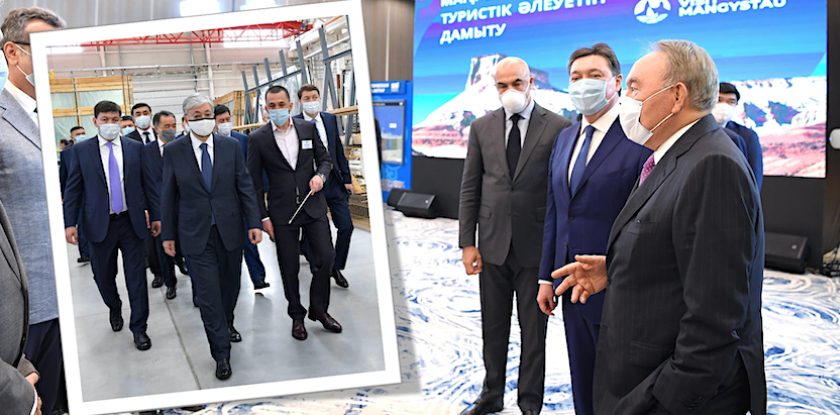For the fifteen months that have past since Nursultan Nazarbayev handed the presidential chair to Kossym-Jomart Tokayev, Kazakhstan has lived through several events that shook the country one way or another — the Arys tragedy, the reduction of the oil prices, the COVID-19 pandemic, the economy slowdown. Overlapping with the not terribly successful results of the Elbasy’s thirty-year «reign», they have presented Kazakhs with a challenge — what is to be done next?
Currently, the country is experiencing the on-going debate on the future of Kazakhstan; so far, however, these debates concentrate around individual and sensitive topics (that affects everyone’s interests) such as the ethnic issues. And that is in spite of the fact that there is a great deal of crucial issues that must be discussed in the public domain — stating from a model for the political system and a format of the national economy and ending with the fate of Nursultan Nazarbayev’s family members.
The problem, however, lies in the fact that, under the current conditions, it is virtually impossible to reach any kind of social pact in Kazakhstan. For instance, in regard to the language issue, they will not find a compromise and reach a consensus in the coming years due to both objective and subjective reasons, in our opinion.
Among the subjective reasons, the key one probably lies on the desire of many a Kazakh nationalist to feed on this subject: to earn political dividends and achieve prominence. As for the objective reasons, one should mention the clear loss of the Kazakhs in the competition with the representatives of the other ethnicities both at the job market and in the business/social sphere which does not give Kazakhs a chance to speak from the position of the dominating ethnicity.
As a result, Akorda and the Library have found themselves in a difficult situation: they need to preserve the infamous internal political stability at all costs, but the number of problems and challenges is getting bigger every day. The authorities clearly have other things to worry about besides engaging in the social dialogue. The best they can to at this point is to imitate it.
Speaking about the situation at hand, we personally are mostly concerned about the absence of the civilised channels of communication between the participants of all the discussions. Theoretically, the following already existing venues may play a part of such channels: a) the Parliament of the Republic of Kazakhstan, b) the Assembly of People of Kazakhstan, c) the National Council of Public Trust, d) civil organisations.
However, it looks like Akorda and the Library (judging by the rhetorics and the actions of those in charge of them) are hoping that the problems will get resolved by themselves, the situation comes to order, stabilises and gets back to the familiar way without any kind of serious reforms.
In our opinion, these hopes are false. In the depths of the society, the lack of understanding will be growing that will later turn into mutual resentment and then into mutual hatred (something that we are already observing today — mostly, on social media thank God).
At the same time, one must understand that the challenges faced by Kazakhstan cannot be responded to individually (the aforementioned ethnic issue for instance). The questions of the future political structure, the accelerated development of the national economy, the significant increase of the level and the quality of life will have to be answered simultaneously.
Of course, currently, the possibilities of the Kazakh authorities greatly surpass the possibilities of the public. The latter, in order to start acting, must first get self-organised. And this process, even given no resentment on the part of the authorities, will take decades (considering the quality of the population today).
On the other hand, Akorda’s and the Library’s political will is enough for the reforms to happen. Who precludes Nursultan Nazarbayev from announcing the renewal of the Assembly of People of Kazakhstan and its staffing not via the selection from above but through, let’s say, signature sheets in support of certain civil activists? And who can stop Kossym-Jomart Tokayev from suggesting the National Council of Public Trust to concentrate on the issues of the country’s future as well as on the reforms program?
However, the likelihood of the First President or his successor to get moving in this direction is close to a zero. Simply because they both are guided by the principle customary for politicians of their age and experience, namely, «let sleeping dogs lie».
Meanwhile, it has already become clear that Kazakhstan needs revolutionary changes. Internationally, in such cases, nontypical politicians are called to power through the electoral mechanism. We have observed this phenomenon many times in the USA and the countries of Europe including France. However, in modern Kazakhstan, this mechanism is not going to work.
Kazakhstan does have an electoral system, however, it is non-functional, therefore, power elects itself. And since, in such a case, the electoral system represents and protects the interests only of the top of the ruling elite, it invariably becomes that very subject of the political process that people do not like and fear and distrust.
It seems like no one — neither among the radical opposition nor in Akorda and the Library — knows how to change the situation. And this means that the reforms in the country are to be delayed not by years but by decades.





